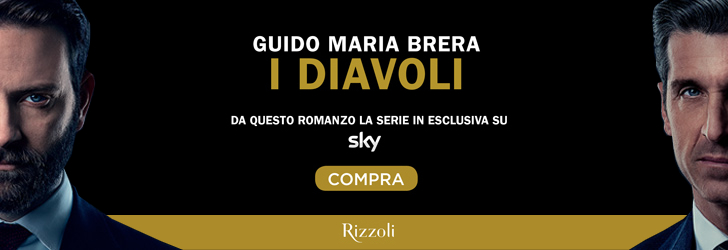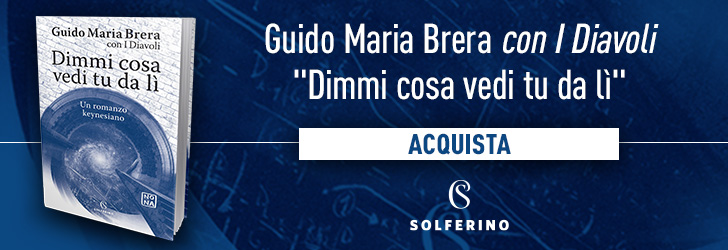
Decodificare il presente, raccontare il futuro
TREDICESIMO-PIANO
gio 14 maggio 2020
BEING DOMINIC MORGAN
The ‘90s: fin de siècle, roaring and unrepeatable. Everything was changing, a real revolution was coming — a cultural, technological, economic one. Something was taking shape, and I could hardly recognize its precedents. I felt like I was at the center of the world, ready to engrave my name in the future. And I was right.
The ‘90s were extraordinary: a roaring fin de siècle, one of a kind. Those who were in their thirties and were an executive director of a big bank, like me, felt at the centre of the world. And we were right.
Everything was changing before my eyes. It was an abrupt, exciting evolution.
My name, Dominic Morgan, was catching on month after month. The future belonged to me.
The usual apocalyptic chorus surrounded everything. Myopic prophets of doom, gazing into the horizon and announcing catastrophes. For some, the world became perfectly calm. For someone else, History was over. They promised misfortune and celebrated funerals — while a new time took its first steps. A real revolution was coming: a cultural, technological, economic one. Something was taking shape, and I could hardly recognize its precedents.
It’s not about the distance currently separating me from that era. It wasn’t about the fact I was 30, the youth filling my eyes with novelty and accelerates the course of events. Actually, history took off like a bucked-off horse. The first Gulf War ended, there was a small recession. Then it all blew up.
Politics was a diver suspended in mid-air. The Democratic Party became the engine of change. Bill Clinton was elected. It was 1992. Bill wanted to be JFK with the saxophone, but the Kennedy’s Camelot had vanished forever in Dallas, on the morning of November 22, 1963. History always repeats itself twice: Jack was the tragedy, Bill was the farce. But the parody was still the occasion for those who were able to take advantage of the events.
The New Business became a religion. The diver entered the water, and it was the baptism of an unforgettable season.
The combination of new technologies and financial deregulation made the banking industry take off. Opportunities multiplied. Our salaries and year-end bonuses multiplied as well. As a young executive, I was able to go through different areas. I plunged into the technology industry by managing dozens of IPOs for emerging companies. There were so many companies in the Silicon Valley that it was impossible to keep track of them. Wired had a cover defining that phase: “The Long Lasting Boom”. Commissions were millionaires, the stock market values increased tenfold in a few months. It was a new Enlightenment.
Technology, of course. Extraordinary years. But there was also the real estate market. Which took off when Clinton started promising a home for everyone. Leveraged instruments were being created to generate new mortgages out of old ones.
These are significant snapshots of that moment. In the big picture, the banks were suddenly remotely managing the public debt, the Treasury auctions. The truth is, we were controlling everything. We were placing securities with our investors. We started entering the rooms that mattered, we started making decisions. The revolving doors between public and private began to swirl. At that point, the federal state’s financial leadership was bank emanations.
Over the course of ten years, investment banks, from being a supporting actor became the dominus of the economy. Financial engineering created monetary base with derivatives, everything was leveraged. The Federal Reserve could no longer contain the excesses, which settled in the unreal economy. One layer at a time.
Then, the bubbles exploded. The over-inflated balloons ended up with a bang and a bunch of plastic on the ground. At the turn of the Millennium, small investors discovered there was little to laugh about. With the end of the technology bubble, ninety percent of dotcoms failed. The Nasdaq collapsed. Natural selection, financial Darwinism, dictated the law.
They were saved by a few, and today their names are known by everyone.
We weren’t upset. Stronger than ever, we directed resources into other areas which still ensured huge returns. I was a 40-year-old man who had already seen enough. A managing director who had always moved with timing, from sector to sector, from market to market. I knew every corner of the bank. Just as I had supported Bill Clinton for the presidency in the early 1990s, so I facilitated his fall at the end of the decade.
Meanwhile, other bombs also exploded. They were drilling holes in the Balkans, storming Belgrade. They had the flake of a “humanitarian war”. Bill’s Democrats and the European Social Democrats sent them, best wishes.
The Zero Years were another war, of a completely different kind. The new Enlightenment turned into a nightmare. Disillusionment and cynicism replaced the enthusiasm of the Nineties. If a death certificate was necessary, 9/11 came and hit an entire country with pain, establishing that an era had dissolved.
Our position was consolidated then: we just needed to check it. Managing the present to look ahead into the future. The centrality of politics returned: we went along with it. Business became security: we passed bag and baggage to the Neocons. As the Democrats had certainly been our investment in the ‘90s, now those guarantees were given to us by the Neocons. On the other hand, finance is free: it isn’t tied to anyone, but joins the spirit of the times.
And it is always devoted to secularism, in its pilgrimage towards the extraction of the highest possible value.

